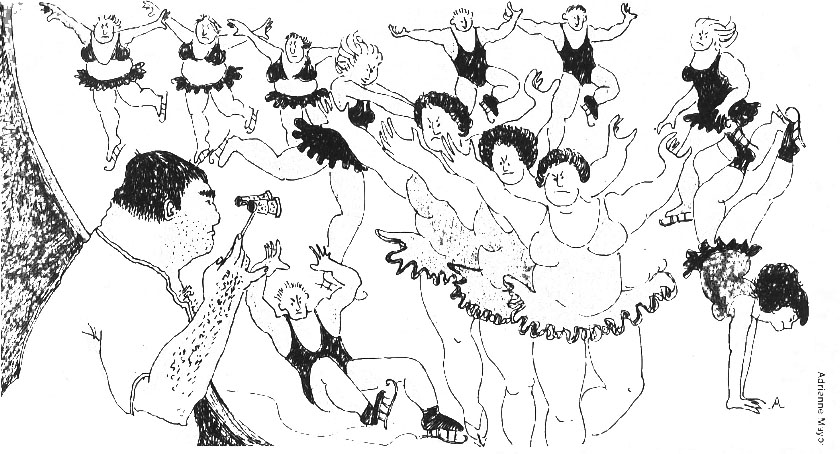
Normally, it would have come and gone and would have left me blissfully deprived of the dubious enjoyment of watching a Ukrainian tour de force on the ice rink and sitting on a hard marble seat for two hours.
But, against my better judgment, I was persuaded to attend one of the last shows in late July by a friend who never misses anything of this nature and this time insisted that I shouldn’t either.

Since it was my friend who was forking out the 300 drachmas for a seat in the middle rows, I thought to myself: “What the hell. Might as well give it a try. Maybe the leading lady will misjudge one of her flying leaps and land in the orchestra pit or, perhaps, as she is being whirled around by the leading man, one of her skates will fly off and brain the Ballet Master in the wings.” The fallibility of the Kiev Ice Ballet’s equipment had already been proved by the breakdown of its refrigerating machine and the postponement of several performances. So I did have grounds for looking forward to some unexpected calamity that would make my day.
It was in this mood of wicked anticipation that I followed my friend into the brightly-lit Stadium, where we were accosted by a simpering usherette who tendered a lavishly illustrated 40-page program. “Fifty drachmas, please, and a little tip (pourboiraki) for me, if you don’t mind, kind sir,” she said, leaving me seventy drachmas in the red and holding a brochure which contained thirty pages of advertisements and the program on the center pages in five-point type.
We took our hard seats in one of the middle rows and I was careful enough to place my friend next to a small child that was in the process of demolishing an extremely runny, chocolate-covered ice cream cone.
The Stadium was quickly filled with some five thousand eager Athenians and as the lights began to dim a powerfully-built man came and sat in the aisle seat next to mine, but not before ostentatiously unfolding a copy of Rizospastis, laying it carefully on the bare marble and then planting his burly bottom on it. I knew Greece’s leading communist newspaper was a source of great inspiration to an estimated eleven or twelve percent of the country’s voters but I hadn’t realized until now that it was possessed of upholstering as well as uplifting qualities. I must admit I wasn’t too pleased at having to spend the next two hours sitting next to a militant proletarian but I reckoned it was a hazard one has to expect when one attends a show put on by performers from the world’s leading socialist paradise.
As the lights lining the ice rink went on, a treacly-voiced woman announcer came loud and strong over the speakers, saying how happy the staff and corps of the Ice Ballet of Kiev were to come from the USSR and perform before a Greek public. The thunderous applause that greeted this announcement went far beyond the degree of enthusiasm warranted by common courtesy to a visiting troupe of artists. I realized then that I was not simply flanked by a dyed-in-the-wool red but totally surrounded by about five thousand fanatics of similar conviction.
By this time, the rink was a colorful eruption of frenzied skating by the entire corps de ballet in traditional costumes, performing the opening number which was entitled, “We are from the Ukraine.” Their timing was perfect and when you thought a line of skaters wa8 about to collide with another line, they somehow merged and formed two new lines, veering off gracefully in opposite directions. Every time they did these little tricks and every time one of them somersaulted on the ice without falling flat on his or her face, wild applause broke out spontaneously from my feverishly enthusiastic fellow-spectators while I cringed in my seat.
I noticed that the orchestra had placed itself well to the left of the ice-rink and that only front row (400 drs.) spectators were exposed to the danger of hurtling bodies and loose skates.
As the fourth number came on, which the program informed me was entitled “Flying Wild Gooses” (sic), I decided to relieve my apprehensions and, perhaps, forget my aching bottom by engaging the man on my left in innocent conversation.
“Splendid dancers, aren’t they?” I said.
He turned and looked at me with an impassive expression on his face. “Yes, they are. Those three are Honored Artist of the Ukrainian S.S.R. and Master of Sport Grzhibovska, Master of Sport and holder of the Silver Championship Medal of the USSR Ignatova and Master of Sport Tairova.
“Really,” I said, sounding impressed and turning to look once more at the graceful figures of the “Wild Gooses” pirouetting and taking flying leaps on the slippery ice.
“You seem to know quite a lot about them,” I ventured.
“Oh, yes. I come here every night,” the man said with a shrug.
I wondered to myself whether the poor fellow was a fervent ice skating balletomane, a masochist or whether he was following strict instructions from his party cell to attend every single performance of the show. I decided to sound him out a little more.
“I see now why they’re so good. Silver medals and all. But don’t you think they’re a little too intense? They don’t seem to be smiling at all.”
His interest was immediately aroused. “Not smiling?” he exclaimed.
“Which one? Which one isn’t smiling?” he asked me, pulling out a small pair of binoculars and scanning the skaters.
“Yes, they look rather grim,” he admitted and then muttered, half under his breath, “but I don’t think that means anything.”
At the interval, the man got up, wandered down the aisle and went over to the low wall behind the stage over which he could peer at the parked caravans of the artists and their dressing booths.
When the second part of the show began, he was back in his seat, showing no sign of wishing to carry on his conversation with me.
I began to wonder if he hadn’t somehow fallen in love with one of the Ukrainian lasses and was desperately trying to strike up an acquaintance with her. That would explain his attending the Ice Ballet every night.
I decided to tackle him again, my curiosity about him having been by now thoroughly aroused and my apprehensions somewhat allayed by the fact that no banners of revolution had so far appeared among the crowd.
“Some of these Russian girls are very pretty indeed, aren’t they?” I commented.
“Are they?” he asked. “I hadn’t noticed.”
The man was beginning to exasperate me. With a hint of sarcasm, I said “I’m sorry, I forgot you communists aren’t supposed to care about looks. All that matters is whether a girl toes the party line and is prepared to produce a passel of proud proletarians.”
He turned to me in surprise. “What makes you think I’m a communist?” he asked.
“Well,” I almost exploded, “You come here every night, you sit on the Rizospastis, what else can I think?”
He laughed. “The Rizospastis is just a blind. If you must know, I’m a reporter from the Eleftheros Kosmos. We got a tip that two of the dancers are planning to defect to the West. I stake out this place every night and another of our chaps covers their hotel. We’re hoping for a scoop but we haven’t had any luck so far, I’m afraid.”
There was another thunderous burst of applause as the “Flying Gooses” finished their number and took a deep bow at the front of the rink. I felt rather sorry for my reporter friend. He obviously didn’t know that “gooses” fly north-south .and never west, particularly when they’re loaded down with silver medals.







